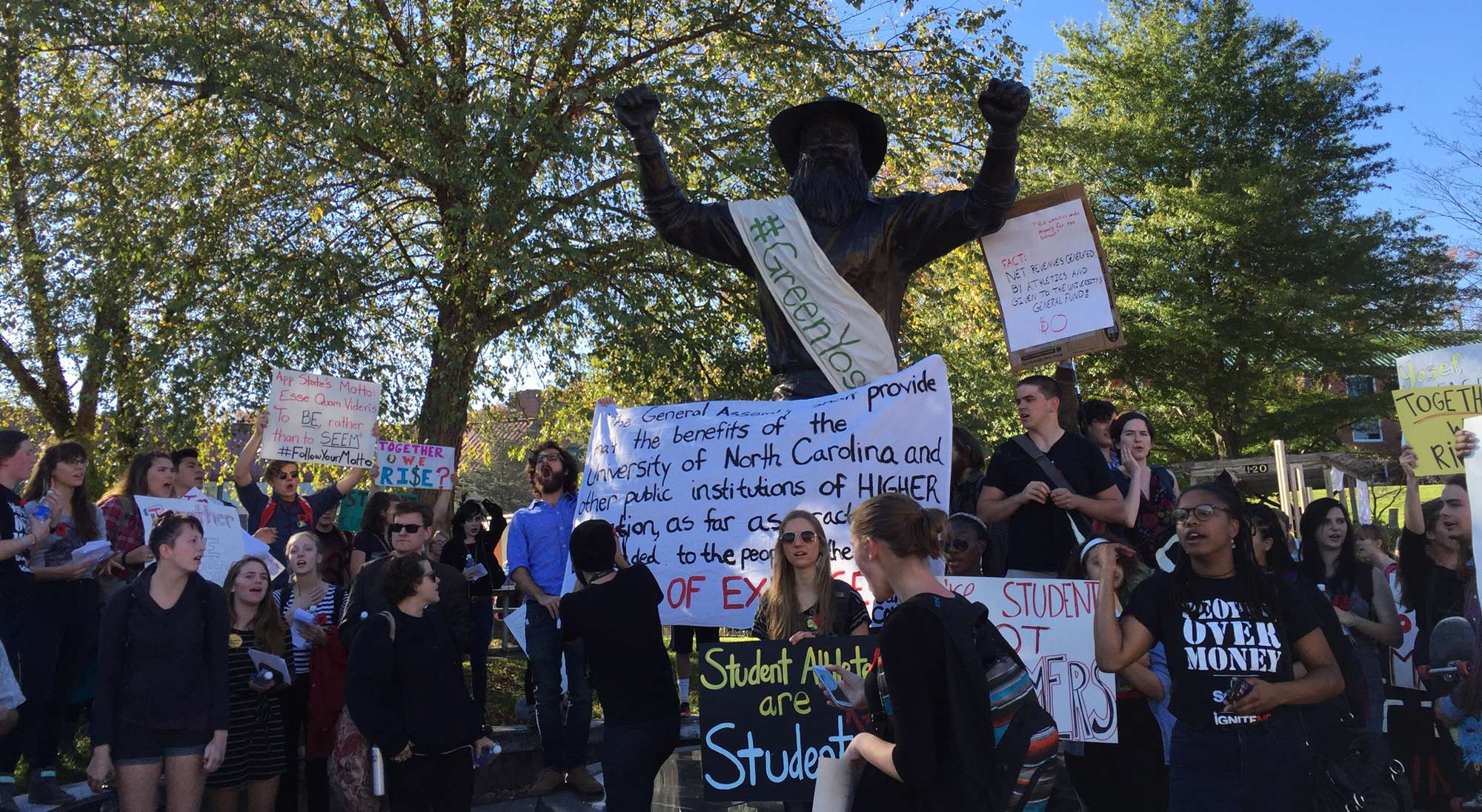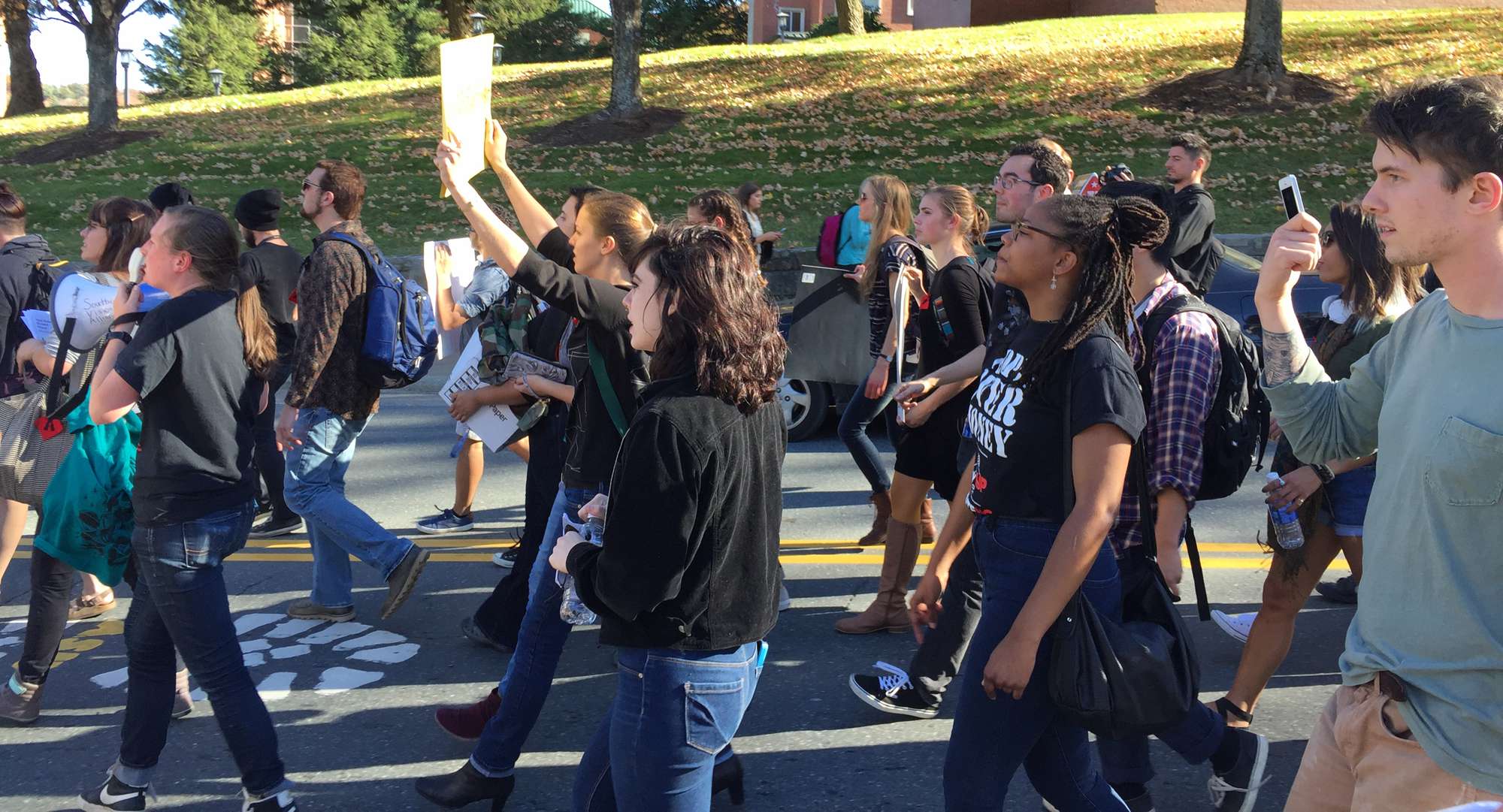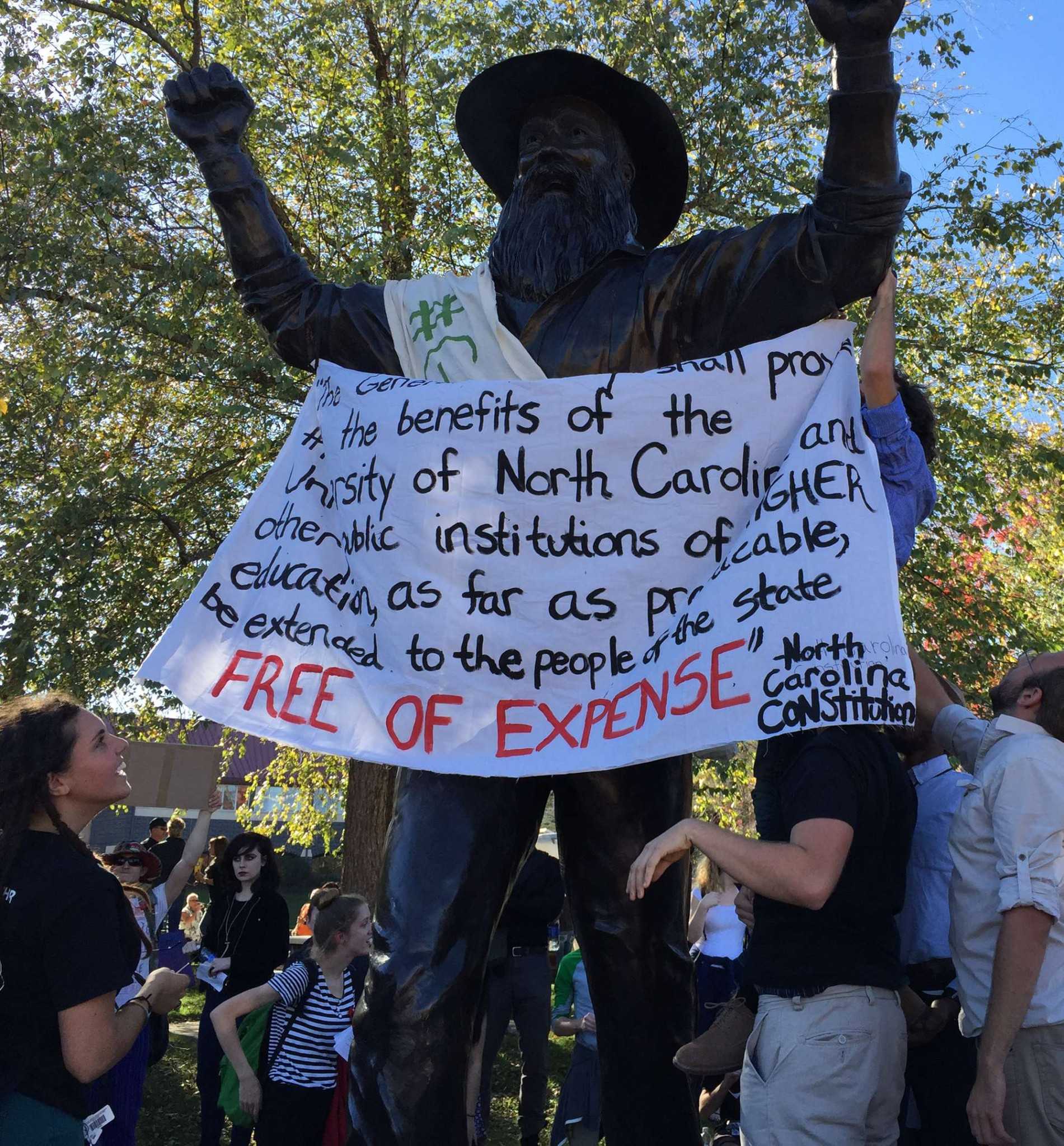Over the past two weeks, student ran organization App State Student Power has staged two protests, with a third demonstration to take place on Thursday preceding the Arkansas State game.
The range of issues addressed by the organization and in the protests ranges from complaints over steadily rising student costs, slowly rising faculty wages, student subsidization of athletic costs and the disproportionately large percentage of black student athletes when compared to minority representation in the student population.
Response to the protests and the issues has been mixed, with counter protesters arriving at the demonstration before the last Thursday’s game day and lukewarm reception in the comments on their Facebook page.
The first of the recent protests took the form of a walkout staged at the stadium parking lot before tailgating for the Georgia Southern game began.
Earlier this year a change.org petition was started in an attempt to have parking for students reinstated for the two Thursday games, which currently has 1,351 out of the 1,500 signature goal.
The walkout, which attracted over 100 students and some faculty, addressed different issues.
An email sent by App State Student Power included a list of grievances including increased spending on athletes, decreased spending on the average student and high salaries of high-ranking university employees.
The protest took the form of students and faculty members taking turns speaking through a megaphone about topics ranging from concerns over lack of funding in their departments, disproportionate athletic funding to black lives matter.
“Today is the first time we’re having a home game for football on a weekday,” Appalachian State Student Power co-founder Rachel Clay said. “So we decided that if the parking lot was going to be taken away from its educational purpose we would take it back and fulfill that purpose.”
Clay said student fees funnel over $9 million into the athletics department, citing the USA Today NCAA finances database.
According to the database, student fees are the largest source of revenue for the athletic department, totaling $9,260,876 in 2014, with the second largest source being contributions to the department totaling $3,633,146 in the same year.
“I think that we’ve been successful in one of our main priorities, which is starting the discussion and disseminating the information to students,” Clay said. “All this information should be much more easily accessible and much more transparent and because we are footing the bill, we should actually have a voice in it.”
Thomas S., an alumnus who declined to give his full last name, arrived at the protest briefly with a group of counter protesters carrying a large Appalachian State flag.
“We’ve heard this crap all week,” S. said. “They’re mad about parking, so they’re going to use it as a platform to protest other things and they’re not actually doing anything. I think they’re better served to go to Raleigh or Chapel Hill or Washington D.C. where they’ll actually mean something.”
S. said the protesters could have gone to schools where football isn’t an athletic priority.
“They could have gone to a school where there’s no athletics. There’s plenty of those schools,” S. said. “They think they’re going to come in here and change a culture that’s worked for decades and I think that’s pretty nearsighted on their part.”
S. said the protesters had good points, but the problems are true for other schools and there are better ways to try and make a difference like lobbying or running for office.
“Don’t just stand in the middle of an empty parking lot when no one’s here,” S. said.
S. said there is a reciprocal relationship between athletes and the school.
“You look at De’Andre Presley, who was a student athlete here, he wouldn’t have come here if he hadn’t gotten a scholarship,” S. said. “De’Andre Presley is now back working with students, to help them.”
Protest organizer Mary Lyons said that the volume of ideas all play into Appalachian State realigning its spending practices.
“The disparate seeming ideas actually align very well,” Lyons said.
Lyons claimed that there were athletes not at the protest due to game preparations and not wanting to be identified.
“I wouldn’t call [sports] a drain,” Lyons said. “I think it’s important to look at the growth that people reference and how quickly the growth has been and I wouldn’t necessarily say that it’s been positive for the community.”
Lyons said that the current funding for athletics is fiscally irresponsible.
“We are going into debt consistently and we can do better,” Lyons said.
Tuesday
Another protest staged by App State Student Power on Tuesday on Sanford Mall, attended by approximately 40 people, addressed the recent UNC Board of Governors decision to increase the salaries of 12 of the system’s chancellors after budget cuts, with Chancellor Sheri N. Everts among them.
“What we’re asking is for Chancellor Everts to renounce her salary increase, which is 17.45 percent, equating to $50,000 and disseminate that to the lowest paid employees at our university,” Clay said at Tuesday’s protest.
Clay said that the budget cuts will cause the university to increase enrollment, tuition and fees but none of the additional expenditures will benefit students or staff.
“We’re relying more and more on non-tenure track and adjunct faculty who get paid $3,000 a class, not even close to a living wage and students are paying higher tuition every single year,” Clay said. “But what we are seeing are programs being cut, less and less books for rental and those fees not coming back to us but going to administrative salaries and departments that don’t generate revenue for the school.”
American Association of University Professors chapter president and associate professor Michael Behrent said it’s outrageous the Board of Governors increased the salaries of some of the highest paid people in the UNC System.
“This is a slap in the face of all hardworking employees of the university as well as of students,” Behrent said. “It probably is an attempt to buy off the chancellors to make them support the Margaret Spellings decision,” Behrent said. “We have a lot of faith in Chancellor Everts but she needs to do the right thing, she needs to renounce her pay raise, say that she’s not going to take the $50,000 and that she opposes the decisions that the Board of Governors have made because they are contrary to the goal of free and quality higher public education in North Carolina.”
Clay said that the petition signed at the protest was taken to the administration building and the request for Everts to give up the raise was shared with the administration.
The next protest staged by App State Student Power is set to take place Thursday, 2:30 p.m. on Sanford Mall. The protest will take the form of a march and address similar financial issues according to the App State Student Power facebook page.
Story by Carl Blankenship, News Editor
Photos by Monique Rivera, Photographer




